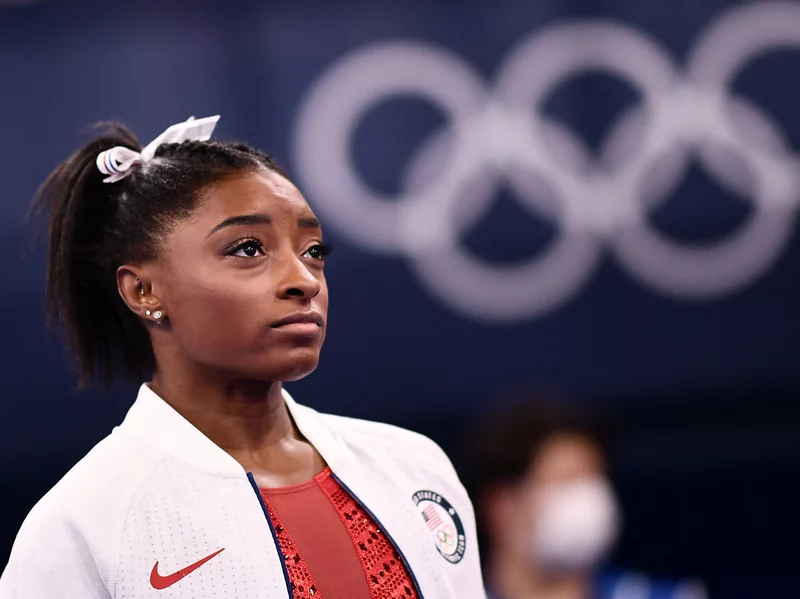Simone Biles at the 2021 Tokyo Olympics. Image courtesy of NPR. Attachments area
“I Have to Do What’s Right for Me”
The stigma and struggles surrounding mental health in professional athletics.
May 2, 2022
Mental health is one of the most stigmatized topics in society; and in athletics, particularly professional and Olympic-level sports, the pressure is piled even higher. Athletes train themselves rigorously, leaving no room for error. While this prepares them physically for high-level competition, mentally, some professional athletes continue to struggle.
Society, however, was generally unaware of this until fairly recently. Professional athletes maintained solid facades; if they were stressed, sad, or angry, the public wouldn’t know. That was how life went on, athletes hiding behind shields, not discussing their mental health either because they were afraid to or because they weren’t allowed.
Recently, though, athletes have begun to speak out about the pressure or negative emotions that they’ve been feeling. One such athlete, Simone Biles, made a very public statement at the 2021 Summer Olympics.
Biles is a well-known professional gymnast who was slated to take the gold at several Olympic events. Most everyone thought that she would be the one taking all the medals and breaking the records.
But at the Olympics, Biles seemed to be struggling with her routines, which she later attributed to “the twisties” – an unofficial gymnastics term that refers to a gymnast feeling like they have no control of their body and no idea where they are in the air.
Following struggles on the beam, a hop outside the boundary lines during floor qualifiers, and a trip on her vault landing, Biles withdrew from the competition. She spoke out about her mental health in several subsequent interviews. Biles talked a lot about all the pressure that high-level athletes are constantly feeling.
“I have to do what’s right for me and focus on my mental health, and not jeopardize my health and well-being,” Biles said in a statement. She received backlash for her decision, but there was also an overwhelming outpour of support, particularly from other athletes and people in the spotlight.
“Even at the Olympics everybody wanted me to win six golds or this or that,” Biles said in an interview about her situation with actor Priyanka Chopra. “And I didn’t meet those needs, and I was really down on myself.”
As Biles consistently showed and stated, the world of professional athletics holds intense pressure. Despite many athletes continuing to struggle in silence, Biles was not the only athlete who spoke out about and took action for their mental health.
Naomi Osaka, a highly regarded tennis player, has been a household name for a while now. In May 2021, before Biles and the Olympics, Osaka dropped out of the French Open due to what was cited as controversy with staff and officials. At the heart of this, however, was negligence of athlete’s mental health.
Osaka refused to attend media events, such as interviews, once she arrived at the tournament. She later revealed why in a post on Instagram. “The truth is that I have suffered long bouts of depression since the US Open in 2018,” Osaka admitted, “and I have had a really hard time coping with that.”
The officials at the tournament stated that all athletes were required to participate in these events and such. “As a sport there is nothing more important than ensuring no player has an unfair advantage over another,” declared American, French, Australian, and English tennis officials. “Which, unfortunately, is the case in this situation if one player refuses to dedicate time to participate in media commitments while the others all honor their commitments.”
The officials also added that Osaka would be fined if she continued to not attend. Following this essential dismissal of Osaka’s – among other’s – mental health by the world’s highest tennis authorities, Osaka dropped out of the tournament.
“I think now the best thing for…..my well-being is that I withdraw,” Osaka stated in the same post mentioned earlier.
For Simone Biles and Naomi Osaka, and every other professional – and non-professional – athlete in between, it’s time to start doing exactly that: what’s best for you. The tribulations of athletes and their mental health have just begun to be shared with the world. The pressure, the fame, the unnrealistic expectations and public lives and everyday difficulties – it’s an incredibly heavy load.
Athlete or not, it’s important to check in with yourself often, and to make sure that your own load is not so heavy that you cannot bear it. The most important thing – as many athletes, Osaka and Biles included, have advocated for – is you and your health.


